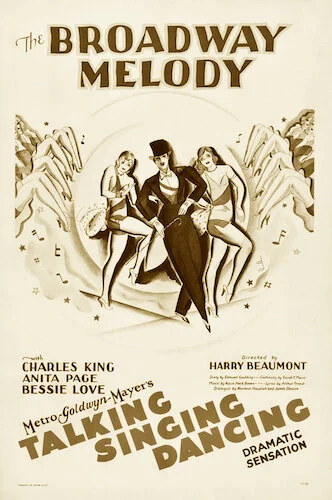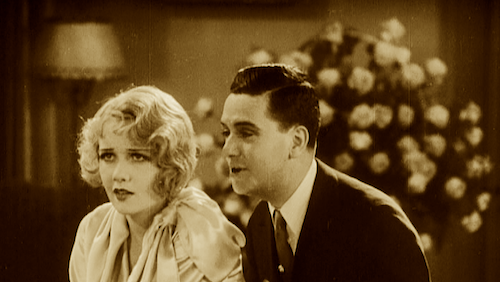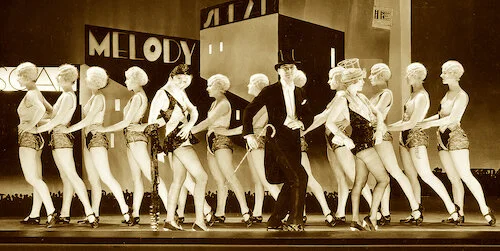The Broadway Melody
This review is a part of the Best Picture Project: a review of every single Academy Award winner for the Best Picture category. The Broadway Melody is the second Best Picture winner, and won at the 1928/1929 Academy Awards ceremony.
Look. I have an understanding as to how The Broadway Melody won Best Picture, but that doesn’t mean I have to decide it’s a great film. Let’s get the complaining out of the way. The Broadway Melody is a simple, borderline half baked story about chasing dreams, following hearts, and striving to distance ones self with the New York hoi polloi. We have love, sadness, the Hollywood ending, and all of the empty space in between. Really, this experience is just for the musical numbers. In 2019, that hardly matters. We’re used to musical films and how well they can be done. It’s like creating a brand new recipe, only for no one to care in a few years when others have added upon your initial meal and made it better.
That’s kind of why The Broadway Melody’s win makes sense, though. At the time, it was one of the firsts of its kind. Talkies were finally being brought to the masses. In this film, there is spoken dialogue and music all throughout. Unlike some previous musicals, The Broadway Melody was all-talkie, without silent moments stuffed in between. There was no sequence that came to life amongst the rest. The entire film was sound. Not only that, but it is one of the first mainstream features to include a Technicolor sequence: the ultimate scene that tied all of the film’s passions and creations together. That scene is deemed lost today, and none of the home releases will have that sequence (nor do I think it will ever be found, to be honest), but you can only imagine the impact back then. This was the 1929 Avatar: an aesthetic cinematic spectacle, which perhaps wears off over time and exposes the narrative flaws. Let’s not all pretend that Avatar wasn’t a big deal ten years ago. The Broadway Melody was a similar deal ninety years ago.
Eddie Kearns trying to win Queenie Mahoney over.
How do these technical achievements hold today? Well, unlike Wings an Academy Awards ceremony before, I would argue that the effects that can be presently seen (so, excluding the lost colour footage) have aged diabolically. Since the equipment for sound recording was so primitive, you can notice gigantic gaffs that audiences back then maybe couldn’t notice (or could turn a blind eye to, given how new sound was at the time). This includes musical numbles that are muffled noises muddled together. There are even moments with background talking during musical numbers, or a complete lack of awareness of what sounds would be picked up when actors or musicians walked past the microphones. It doesn’t feel good to complain about technological disadvantages of an older film, but if the main reason to see this film doesn’t cut it nowadays, it makes the rest of the film hard to sit through.
Oh yeah, there’s an actual story to this film as well. The Mahoney sisters (Queenie and Hank) are invited to New York to perform in Eddie Kearns’ latest Broadway production. We get the same-old story with these sisters: one is the talented sister, and the other is known for her looks. It’s an incredibly tired trope by 2019, but I would argue that in a film that does very little to nuance these characters past these stereotypes, it was likely even tired back in 1929. Both of their relationships bounce around, and the film pays a bit of attention to where these relationships go (when it isn’t hell bent on getting these musical numbers out in the forefront).
To the film’s credit, the presentation of some of these dance numbers is actually quite good.
As astoundingly bland as The Broadway Melody is, I can admit that it is honest and well intentioned. It isn’t director Harry Beaumont or the producers’ faults if the film has not stood up well against the test of time, especially if it was a relatively unique film when released. Did it help pave the way for all of the musicals that followed afterwards? Absolutely. That doesn’t make it the ultimate musical, but the guinea pig that let the other films know that the coast is clear, and the world is ready for these kinds of films. The Broadway Melody is inoffensive, and at times worthy of a smile or two. It’s still impressively boring, but the Academy selected much worse Best Picture winners after this film (damn, did they ever).
Andreas Babiolakis has a Masters degree in Film and Photography Preservation and Collections management from Ryerson University, as well as a Bachelors degree in Cinema Studies from York University. His favourite times of year are the Criterion Collection flash sales and the annual Toronto International Film Festival.






